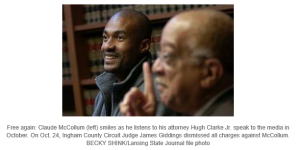- Original trial: McCollum, defendant in LCC slaying takes the stand
- Guilty until proven innocent: The system can improve
- McCollum suit seeks damages 50 pages detail allegations against LCC, city, prosecutors
January 1, 2008
A reckless investigation and prosecution led to the wrongful conviction of Claude McCollum, according to a lawsuit seeking monetary damages.
The suit, filed Thursday in Ingham County Circuit Court, names several law enforcement officials as defendants, including Lansing Community College Chief of Police John Imeson and Ingham County Prosecutor Stuart Dunnings III.
The 50 pages of allegations say police tricked McCollum into incriminating himself, ignored a forensic scientist who told them they had the “wrong person” and failed to disclose video evidence arguably showing McCollum’s innocence. It also says prosecutors failed to hand over that evidence to McCollum’s attorney.
McCollum is seeking damages in excess of $25,000. However, a jury could award more.
Dunnings, who has been in office since 1997, said lawsuits are an unfortunate consequence of his job.
“I’ve been sued several times in my role as prosecutor,” he said. “I anticipate this case will end up as those did – being dismissed before trial.”
McCollum, 30, of Lansing, served 1 1/2 years of a life sentence before Dunnings in October declared him innocent of the 2005 rape and murder of Lansing Community College professor Carolyn Kronenberg. That same month, a judge dismissed all the charges.
“What happened to him is simply a travesty that we have to make sure never happens to anyone else,” said Hugh Clarke Jr., one of three attorneys representing McCollum. “The lawsuit is a mechanism to address the injustice and continued threat of prosecution to Mr. McCollum.”
Clarke and prosecutors are engaged in a battle over legal terminology used in court documents dismissing the charges. As it is worded now, prosecutors could again bring charges against McCollum, although that is highly unlikely.
McCollum declined to comment.
2005 report
Also listed in the lawsuit as a defendant is Michigan State Police Detective Sgt. James Young, who wrote a March 2005 report suggesting that McCollum was not near the scene of the crime when it occurred. Prosecutors said they received the report during McCollum’s 2006 trial and immediately turned it over to McCollum’s attorney.
That attorney, Lee Taylor, said he never received it. The lawsuit also alleges that he was never told about its conclusions and that the trial prosecutors, Eric Matwiejczyk and Marie Wolfe, knew that McCollum’s attorney did not know about the report and its findings, “and hoped the information in the report would not be uncovered.”
McCollum was taking classes at LCC and occasionally sleeping in campus buildings when he was charged with the crime.
Police arrested him after he gave a statement – which included references to a levitating phone receiver and a 60-year-old woman in a martial arts stance – about how he could have killed the professor.
No DNA, fingerprints or blood evidence linked McCollum to the crime scene.
Getting the facts
Also being sued are the city of Lansing, Ingham County and Lansing Community College. Officials from those agencies, Lansing police and Michigan State Police declined to comment.
Lansing Police Chief Mark Alley said: “Lawsuit or no lawsuit, what is important here is that all the facts in this case are made public.”
The lawsuit also claims:
• Detectives “manipulated, tricked and deceived” McCollum, who has “cognitive deficiencies,” resulting in his statements about details of the crime.
• Investigators ignored former state police forensic scientist Ann Chamberlain when she tried to make it known “that they had the wrong person in custody for this crime.”
• Prosecutors “intentionally” chose not to ask detectives when they testified at trial about video evidence arguably showing McCollum in another building when Kronenberg was killed.
Chamberlain, who analyzed blood and DNA evidence in the case, became concerned when she found no blood on any of McCollum’s clothes, despite “a substantial amount of blood” at the crime scene.
Despite repeated requests by Chamberlain, LCC Detective Rodney Bahl – who is believed to be a lead investigator on the case – would not confirm the type of clothing McCollum was wearing the day of the killing, according to the lawsuit. Chamberlain also ruled out McCollum as a source of DNA found under Kronenberg’s fingernails.
The lawsuit also names retired Lansing police Detective Bruce Lankheet, who conducted the interrogation that led to McCollum’s statements.
“The actions of all Defendants were … undertaken to secure a conviction rather than determine the truth,” the lawsuit asserts.
‘Start a new life’
On Thursday, Carol McCollum, Claude’s aunt, said she was glad the suit was filed and believes compensation would help Claude “start a new life.”
“We need to see some happy days for Claude,” the Delta Township woman said. “He’s been hurt enough. This will help him heal, get his life back on track. This will help him be independent as a man.”
But it is unclear how far the suit can go.
It is extremely difficult to successfully sue prosecutors and only slightly easier to successfully sue police, said Lee Strang, a professor at the Michigan State University College of Law.
Prosecutors have “absolute immunity,” unless it can be shown that misconduct occurred when they were acting in a nonprosecutorial capacity, such as investigating a crime or performing police-like functions, Strang said.
It also must be shown that prosecutors did more than just make a mistake. A plaintiff must show that the prosecution knew a defendant was innocent, but continued with the case, anyway.
“You have to show (the prosecutor) intended in bad faith to put you away,” Strang said.
Police are sued more frequently and those lawsuits are more often successful, Strang added.
“People need to see that the judicial system works,” Carol McCollum said. “You can’t just do wrong and sweep it under the rug.”
Reference Link: http://archive.lansingstatejournal.com/article/99999999/NEWS01/81223009/McCollum-suit-seeks-damages

